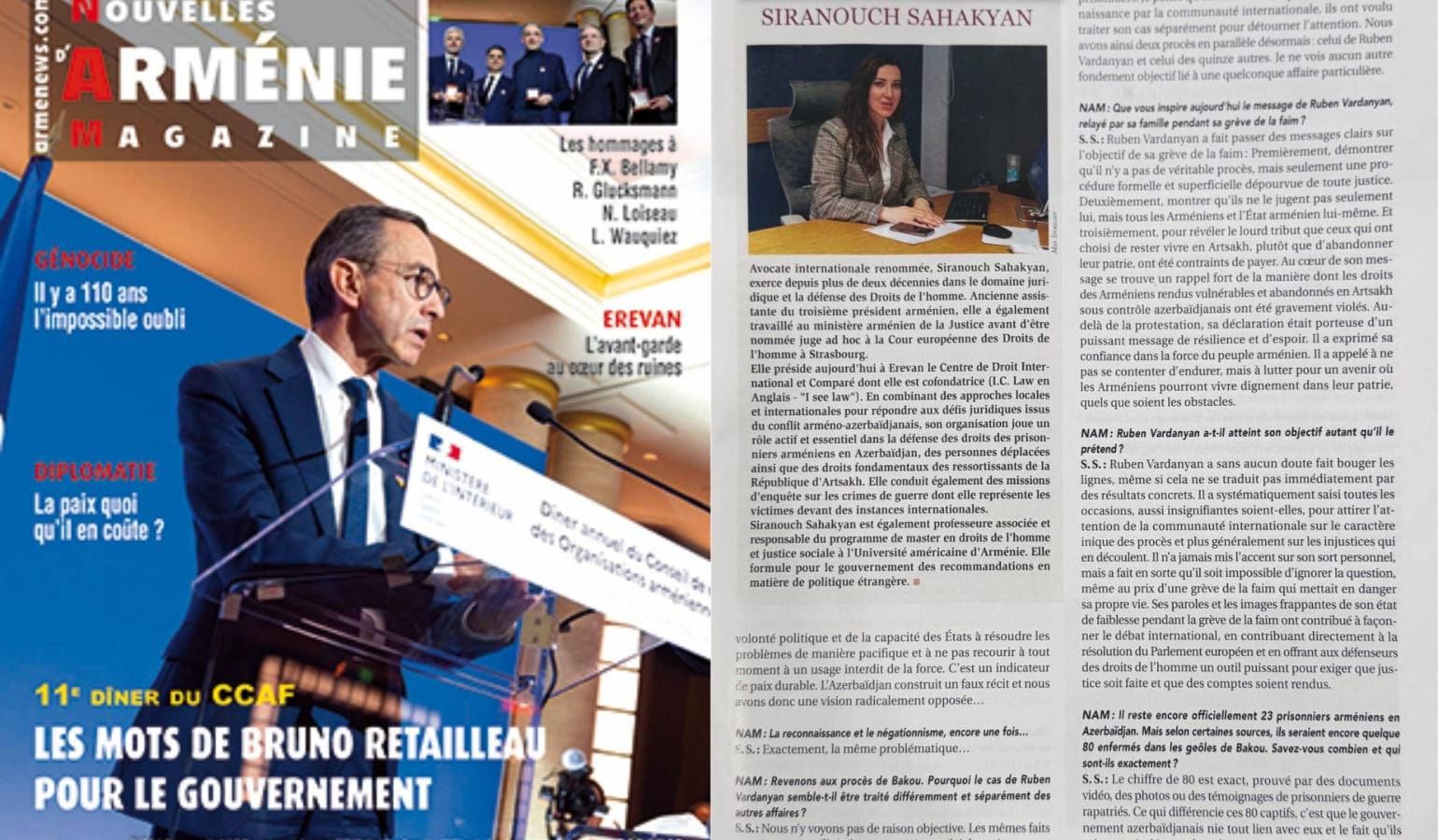
The Fate of Prisoners and Peace Negotiations: Sahakyan's Interview with "Noubelles D'Arme'nie"
The 327th issue of the French magazine "Noubelles D'Arme'nie" featured an interview with Siranush Sahakyan, head of the "Centre for International and Comparative Law." The human rights defender answered questions regarding the status of Armenian prisoners held in Baku, Armenia's stance and actions on this issue, and the differences in capabilities between the state and human rights organizations on international legal platforms.
Regarding Yerevan's official positions and delayed responses concerning the fate of Armenian prisoners of war held in Baku, the human rights defender noted that Armenia is conducting peace negotiations with Azerbaijan and states that it must be extremely cautious in its diplomacy. "We do not see suitable preconditions for building lasting peace. We believe that the main precondition for lasting peace is the legal resolution of disputes. Humanitarian issues, such as the release of prisoners of war, must be resolved in this way. On the other hand, the government believes it can be absolved of this responsibility and refuses to make any statement that, in their opinion, could jeopardize the so-called peace negotiations," Sahakyan emphasized.
According to the human rights defender, measures have been taken, but they are not exhaustive or targeted. She agrees with Ruben Vardanyan's lawyer, Jared Genser's assertion that Prime Minister Nikol Pashinyan could do much more than he is currently doing. "The government can send torture cases to the International Court of Justice, but it does not want to initiate new cases and is even discussing the possibility of withdrawing some proceedings. We do not support this approach. We do not believe that a political formula guarantees human rights protection and can be balanced. We see a weakened Armenia that accepts all of Azerbaijan's demands and makes more and more concessions for a peace that does not seem stable."
Addressing Ruben Vardanyan's case, Sahakyan noted that she sees no objective reason why Vardanyan's case has been separated from the others. The same facts and evidence are being used in his trial and in the trials of the other fifteen individuals. The interview also touched upon Ruben Vardanyan's message during his hunger strike. "Ruben Vardanyan sent clear messages about the purpose of his hunger strike: first, he showed that there is no real trial, but only a formal and superficial procedure devoid of any justice. Second, he showed that not only he, but all Armenians, are being judged. And third, he revealed the heavy price that those who chose to remain in Artsakh were forced to pay. In addition to being an act of protest, this statement was also a message of resistance and hope. He called for a fight for a future where Armenians can live with dignity in their homeland."
The Status of Armenian Hostages
Are the 23 Armenians held in Baku hostages or prisoners of war? "A prisoner of war becomes a hostage when their fate is conditioned by political demands. Azerbaijan uses Armenian prisoners to put pressure on the Armenian government and gain political advantages in exchange for their release. Legally, there are civilian detainees, political prisoners, and prisoners of war in Baku. The eight leaders are political prisoners. They were wanted by the Azerbaijani government for their public activities, for declaring Artsakh's independence, for their efforts to gain its recognition, or for condemning the humanitarian crisis during the blockade."
Regarding the signing of a peace treaty and the consequent change in the status of Armenian hostages, Sahakyan is skeptical, as Azerbaijan has repeatedly shown that it is ready to use any means to disrupt the peace process. "Even if such an agreement is signed, there is no guarantee that it will include specific provisions for the release of Armenian prisoners. This raises serious concerns about Azerbaijan's future behavior. Therefore, Armenia's decision to sign a peace agreement must be conditioned on the unconditional release of all prisoners."
Can civil society, NGOs, and the diaspora replace or do more than the Armenian government to ensure the release of prisoners? In Sahakyan's opinion, some actions require state support, if not from Armenia, then from other states. "NGOs cannot guarantee the right to consular visits, as that is a state's prerogative and falls within national sovereignty. The same applies to torture issues; only the state can initiate a lawsuit at the International Court of Justice (ICJ). It is clear that NGOs play a vital role, but state involvement is crucial to exert real pressure," Sahakyan emphasized.